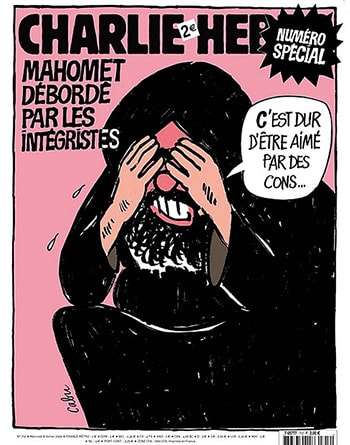The Volokh Conspiracy
Mostly law professors | Sometimes contrarian | Often libertarian | Always independent
Newspaper in India shut down for printing 2006 Charlie Hebdo cover

The New York Times (Neha Thirani Bagri) reports:
[A]n Urdu newspaper [Avadhnama] has closed and its editor [Shirin Dalvi] faces charges and death threats for having reprinted a cartoon of the Prophet Muhammad from the satirical French weekly….
All the employees of the daily newspaper, Avadhnama, were dismissed in the days after Jan. 17, when it published a 2006 cover from Charlie Hebdo showing Muhammad weeping. That image was part of the newspaper's coverage of the aftermath of the deadly assault on Charlie Hebdo's Paris offices on Jan. 7 by Islamist militants, who said they were avenging Muslims offended by the French newspaper's cartoons.
Ms. Dalvi was arrested on Jan. 28. She has been out on bail, but is in hiding because of threats against her.
At the urging of Urdu Patrakar Sangh, an association of Urdu-language journalists in Mumbai, five police complaints against Ms. Dalvi were filed from precincts across the city on the day her newspaper published the cartoon.
"You are free to write anything in our country, but you are not free to hurt religious sentiments," said Nusrat Ali, a reporter with an Urdu weekly who was among those filing the complaints.
"Why would she print something that has caused tension and violence across the world?" he asked. "Publishing such cartoons threatens the peace and calm of our country."
In a related story, CNN (Mackenzie Sigalos) reports:
The so-called "intermediary guidelines" [implemented by the government in 2011] implicated web platforms themselves. The rules now require Internet companies to take down any content seen as "disparaging," "blasphemous," or "defamatory" within 36 hours of a user submitting a formal request for removal.
And the CNN story reports on other speech restrictions in India, not related to blasphemy; for instance,
In 2012, the chemistry professor [Ambikesh Mahapatra] was arrested for circulating by email a cartoon that poked fun at West Bengal Chief Minister Mamata Banerjee. The cartoon, which was a parody of a scene in a popular Indian movie, went viral on social media.
He was charged with a range of offenses including defamation, insulting a woman and sending offensive messages from a computer. Mahapatra called the charges a misuse of the law "in the name of surveillance, to curb democratic rights, freedom of speech and human rights of common people."
Cyber law in India stipulates that alleged offenders could face up to three years in jail for posting material that is "grossly offensive," has "menacing character," - or perhaps even more ambiguously - causes "annoyance or inconvenience."


Show Comments (0)